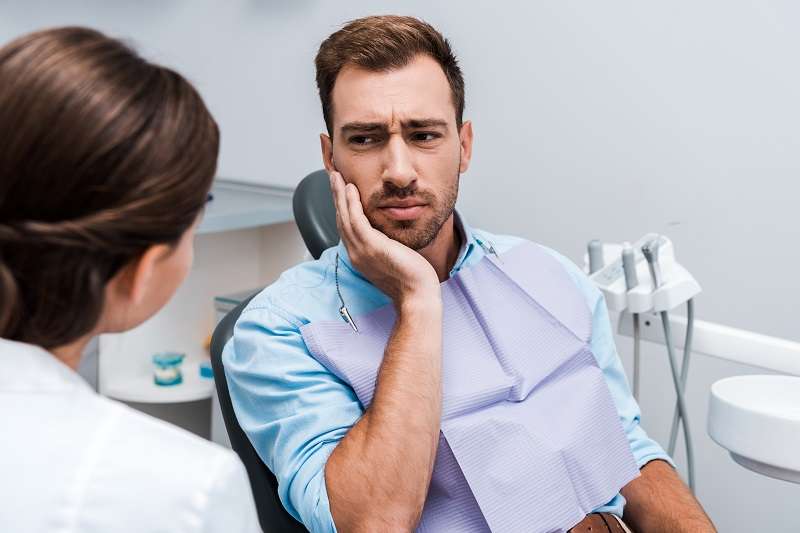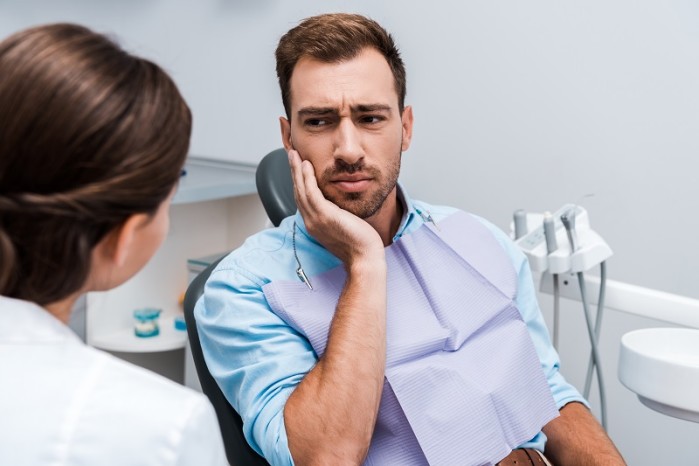Can teeth cause headaches?
Poor dental health can negatively affect the entire body. Toothache can therefore cause headaches, but it is not only bad teeth that are the cause. Malfunctions in the masticatory organ – which includes the masticatory muscles, the temporomandibular joints and the muscles of the tongue, throat and neck – are often indirect triggers for headaches. Bruxism (teeth grinding) also triggers tension headaches in many people.

Symptoms: headaches caused by teeth
Since the connection between headaches and toothache is often difficult to spot, you should definitely seek medical advice in the event of enduring symptoms.
Indications of tension headaches caused by teeth grinding can include pain in the jaw, for example, or aching facial muscles first thing in the morning after getting up, but tension in the shoulder and neck muscles are also possible symptoms.
In the case of pressure headaches, on the other hand, bacteria are usually involved that implant themselves in the paranasal sinuses that come from the oral cavity. This results in painful inflammation with purulent discharge. These kind of symptoms can occur regardless of the state of one's dental health, but a visit to the dental practice is advisable in the event of longer term complaints.
Causes of headaches due to teeth
There are many triggers for dentally induced headaches, and they should not be taken lightly. In some cases, the cause can be a craniomandibular dysfunction (CMD), a collective term for functional disorders of various kinds that covers the region of the teeth, the masticatory muscles and the temporomandibular joints. Because of its different manifestations, CMD is often difficult to diagnose. The pain particularly affects the head, back, neck, eyes and ears. According to scientific studies, 27.4 percent of CMD patients suffer from chronic headaches. According to a survey by health insurance providers, millions of UK citizens suffer from complaints and pain, which are often caused by the masticatory system:
Migraines: 8.3 million people
Nocturnal teeth grinding and clenching: 18.9 million people
Tension headaches: 4.7 million people
Headaches due to clenching one's teeth and jaw clenching
Nocturnal teeth grinding (bruxism) and clenching not only lead to massive abrasion of the teeth, but also to strong tension in the jaw muscles, and the masticatory and facial muscles in many people. These can then radiate to the forehead and temples and cause headaches. Other consequences of teeth grinding include: clearly ground down, shorter teeth, missing canine tips, and cracks in the tooth enamel.
Simple bite splints are often used to treat teeth grinding and the associated headaches. These work wonders for most patients. Not only are the teeth better spared, but the headaches and neck pain can also be significantly reduced this way.
Headaches due to crooked or bad teeth
If diseased teeth or inflamed gums remain untreated for a prolonged period of time, the whole body can be massively weakened. An impaired temporomandibular joint can also lead to headaches, back pain and ringing in the ears. Things become dangerous when toxins from bacteria reach the rest of the body via the bloodstream and attack organs. The not only results in headaches from an inflamed tooth, for example: it can also cause depression, premature births, pneumonia, brain infections and strokes.
In addition, crooked teeth can trigger headaches, as certain misalignments affect the bite and cause problems in the region of the throat and neck. It is therefore highly advisable to treat crooked teeth. Also because, otherwise, the teeth and gums can get seriously damaged.
WHAT YOU CAN DO ABOUT CROOKED TEETHHeadaches due to wisdom teeth

Wisdom teeth are another cause of headaches. Wisdom teeth can, for example, press on a nerve as they grow, or the soft tissue becomes inflamed as the tooth slowly erupts, which then triggers an abscess. In addition, the tip of the root can become inflamed. All of the above examples can be accompanied by intense headaches. Wisdom teeth are often pulled out so that they can no longer cause headaches. If this is done, the pain usually goes away completely.
Headaches can also occur after a wisdom tooth operation. Depending on the type of operation, the duration can vary, but pain for the first 7–14 days after the operation is completely normal. You will usually be prescribed a pain medication for after the operation, though, which (almost) completely suppresses the pain.
Can teeth cause migraines?
Migraines are a complex clinical picture, and their cause has not yet been fully clarified by the science. Among other things, we suspect that CMD can promote migraine attacks, but there is no concrete data on this. Unlike the proven connection between bruxism and tension headaches, the connection between migraines and teeth grinding has not yet been proven. However, severe migraine headaches in connection with teeth grinding are quite conceivable.
It is also conceivable for migraines to be triggered by bad teeth, such as in the case of tooth decay, root infections or periodontitis. A faulty bite due to misaligned teeth or crooked teeth, for example, is another possible cause.
What can you do about it?
To find out whether your teeth are a possible trigger for headaches or migraines, dentists can, for example, carry out a functional analysis. Individual therapeutic measures can then be derived from this. Often, an occlusal splint is enough, and this helps to relieve the masticatory muscles.
Regular checkups by the dentist are advisable in addition, so that tooth decay is detected early. Having your teeth professionally cleaned twice a year also contributes to dental health.
Found out more about Dental Hygiene